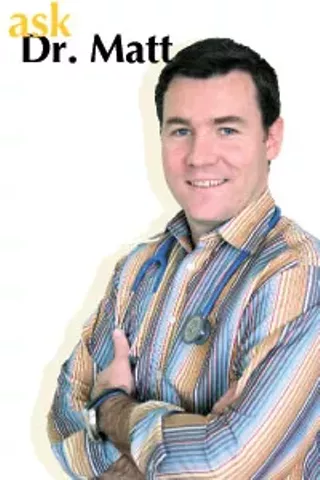Q. I have three kids and someone is always sick. Yet now I read that I’m not supposed to give them over-the-counter cold medicines. Why not? What should I do instead?
A. The season for sneezing has arrived. The best way to prevent a cold is to stay away from others with colds. (Good luck with that.) Fortunately, most colds are short-lived, lasting seven to 14 days. The trouble is, toddlers and school-age children get eight to 12 colds a year — and typically, they pack those illnesses into about eight months time.
Battling a cold consumes a lot of energy, so rest is important — as is fluid, because war makes cells thirsty. There are anecdotal reports of other remedies to help fight colds, like megadoses of vitamin C, zinc, echinacea, etc. However, none holds up very well under the scrutiny of scientific investigation and can even pose some risks for harm when used in children.
So the best we can do is to relieve symptoms, while allowing time for rest and recovery.
Fever and aches respond best to medicines that block the inflammatory chemicals being produced by the infected tissues. The best example of this type of medicine is ibuprofen. Never use actual aspirin in children — it doesn’t play nicely with viruses in a child. Acetaminophen can help cool things down, although it doesn’t do much for the aches and fatigue.
You can consider the mucus that accompanies a cold to be the carnage of the war between the immune system and the virus. That mucus can threaten the airway of the host; fortunately, coughing moves the mucus up and out. So although we don’t want to suppress the vital cough reflex, it is OK to reduce the need to cough by reducing the amount of mucus hanging around. For example, blowing a nose (tough to do if you are an infant), or gently suctioning a nose can help reduce the juiciness. Thinning mucus with saline drops or a humidifier can also help. In younger children, there may be mucus deeper in the chest that humidified air can help thin. Elevating the head of the bed or crib can also reduce pooling of secretions that can lead to gagging and subsequent cough.
There are many over-the-counter medicines that attempt to address various symptoms of the common cold. Some claim to be cough suppressants, but these are hardly potent enough to actually suppress the powerful cough reflex — for that, you need narcotics like codeine. There are expectorants that, strangely enough, actually work by inducing production of additional secretions, which in turn may have a thinning effect on thicker secretions already present. There are antihistamines and decongestants, often served up together, which attempt to reduce production of mucus and have a drying effect on mucus membranes.
Recently, however, the FDA recommended that children younger than 6 not be given any over-the-counter cold medicines. They gave two reasons: There is excellent evidence that thousands of children every year are brought to emergency rooms due to misuse of these medicines, usually because of overdose. Additionally, there is a lack of evidence to suggest any of these medicines are helpful. This doesn’t mean they are not actually helpful in some cases, just that there is no evidence to prove it. And there are a few studies, although small and significantly flawed, that suggest that these cold remedies are no better than a placebo in the treatment of colds.
Yet these medicines remain on the grocery store shelves, staring down at desperate, sleep-deprived parents, without any guidelines for dosing children. It defies logic that this is the plan to reduce the risk of overdose. But until some better studies come out proving certain OTC medications are safe and effective in children, you will have to confer with your child’s care provider for guidance regarding their use.
In some cases, the common cold sets up a perfect environment for a bacterial infection. This is often the case with ear and sinus infections and pneumonia. For these conditions, or for a prolonged cough or a cough associated with distress, wheezing or a barking sound, your child should be seen in the office.
Matt Thompson is a pediatrician at the Kid’s Clinic in Spokane.















